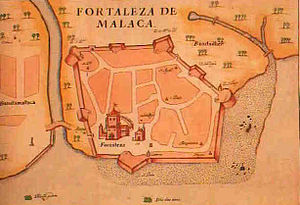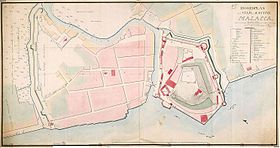- Malayan-Portuguese War
-
This article is about the armed conflict in Malacca. For the occupation of Malacca, see Portuguese Malacca.
Malayan-Portuguese War 
A Famosa The main Battlefield.Date 1511–1641 Location Malacca, Malaysia Result Portuguese Conquest of Malacca
Portuguese control of the Indian Ocean tradeBelligerents  Sultanate of Malacca
Sultanate of Malacca
 Dutch East India Company
Dutch East India Company
 Sultanate of Johor
Sultanate of Johor Portuguese Empire
Portuguese EmpireCommanders and leaders  Mahmud Shah
Mahmud Shah
 Cornelis Matelief de Jonge
Cornelis Matelief de Jonge Afonso de Albuquerque
Afonso de Albuquerque
 Martim Afonso de Castro
Martim Afonso de CastroThe Malayan–Portuguese War was an armed conflict involving Malacca forces, Sultanate of Johor and the Dutch East India Company, against the Portuguese Empire.
Contents
Background
The port city of Malacca controlled the narrow strategic strait of Malacca, through which all sea-going trade between China and India was concentrated.[1] The capture of Malacca was the result of a plan by the King of Portugal Manuel I, who in 1505 had resolved to thwart Muslim trade in the Indian Ocean by capturing Aden, in order to block trade through Alexandria, capturing Ormuz, in order to block trade through Beirut, and Malacca to control trade with China.[2]
Capture of malacca
Further information: Capture of Malacca (1511)In 1509, Diogo Lopes de Sequeira was sent to Malacca by the king of Portugal with four ships in order to establish contact with the Sultanate of Malacca. Initially, Sequeira was well received by the Sultan Mahmud Syah (1488–1528). Soon however, the Muslim community convinced Mahmud Syah that the Portuguese should be eliminated. Several men were captured and killed, but the ships escaped.[3]
Albuquerque first departed from India for Malacca in April 1511, with 1,200 men and 17 to 18 ships.[1][3] Albuquerque's objective was to sever Islamic trade and Venetian trade on the same occasion. A first attack by the Portuguese failed on 25 July 1511.[1] Albuquerque's captains spoke against another attempt, but he struck again, succeeding in capturing Malacca in August, despite strong resistance and the presence of artillery on the Malaccan side.[1][3] In celebration, Tristão da Cunha was sent to Pope Leo X in Rome with rich presents including the elephant that the pope named Hanno.[1]
Cape Rachado
Further information: Battle of Cape RachadoMalacca, which was earlier the capital of the Sultanate of Malacca, was sieged and wrested by the Portuguese in 1511, forcing the Sultan to retreat and found the successor state of Johor and continue the war from there. The port city, which the Portuguese had turned into a formidable fortress, was strategically situated in the middle of the strait of the same name giving control to both the spice trade of the Malay archipelago and supremacy over the sea lane of the lucrative trade between Europe and the Far East. The Dutch East Indies Company (VOC) decided that to expand further to the east, the Portuguese monopoly and especially Malacca must first be neutralized.
Last battle of the Malacca
Further information: Battle of Malacca (1641)In the early 17th century, the Dutch East India Company (Verenigde Oostindische Compagnie, VOC) began the campaign to destroy Portuguese power in the East. At that time, the Portuguese had transformed Malacca into an impregnable fortress (the Fortaleza de Malaca, controlling access to the sea lanes of the Straits of Malacca and the spice trade there. The Dutch started by launching small incursions and skirmishes against the Portuguese. The first serious attempt was the siege of Malacca in 1606 by the third VOC fleet from Holland with eleven ships, led by Admiral Cornelis Matelief de Jonge that lead to the naval battle of Cape Rachado. Although the Dutch were routed, the Portuguese fleet of Martim Afonso de Castro, the Viceroy of Portuguese India; suffered heavier casualties and the battle rallied the forces of the Sultanate of Johor in an alliance with the Dutch and later on with the Achehnese.
A Famosa
Further information: A FamosaIn 1511, a Portuguese fleet arrived under the command of Afonso de Albuquerque. His forces attacked and successfully defeated the armies of the Malacca Sultanate. Moving quickly to consolidate his gains, Albuquerque had the fortress built around a natural hill near the sea. Albuquerque believed that Malacca would become an important port linking Portugal to the Spice Route in China. At this time other Portuguese were establishing outposts in such places as Macau, China and Goa, India in order to create a string of friendly ports for ships heading to China and returning home to Portugal.
References and notes
Categories:- Warfare of the Early Modern era
- Wars involving Portugal
- 16th-century conflicts
- 17th-century conflicts
Wikimedia Foundation. 2010.

